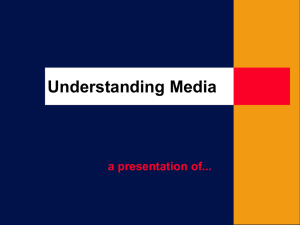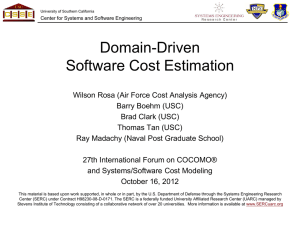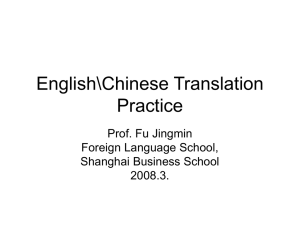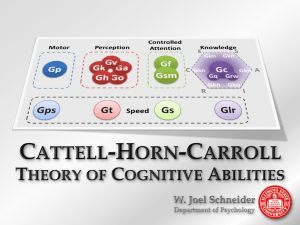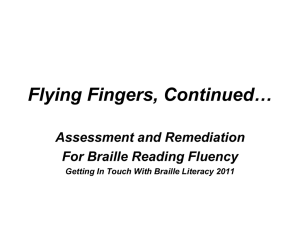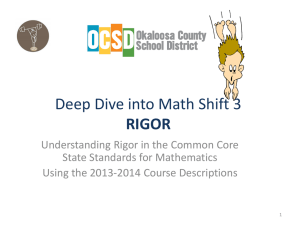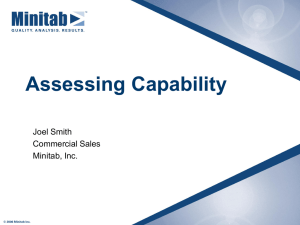Document
advertisement
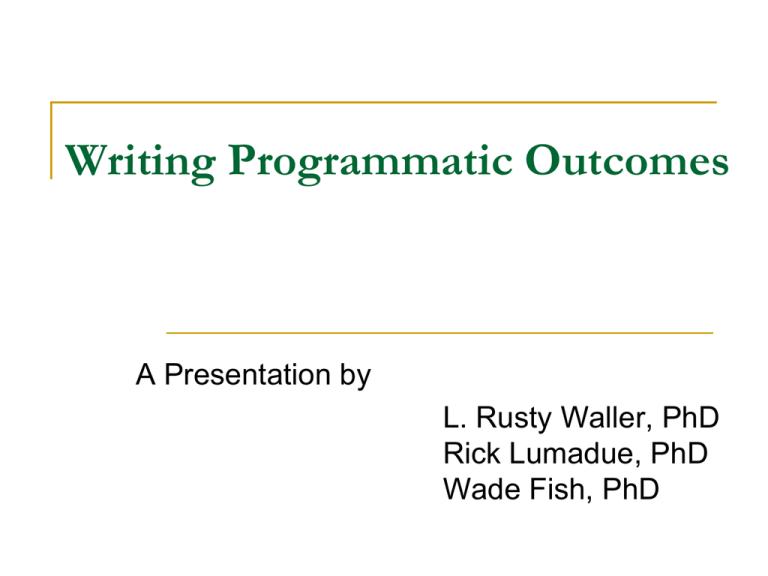
Writing Programmatic Outcomes A Presentation by L. Rusty Waller, PhD Rick Lumadue, PhD Wade Fish, PhD Issues for Today’s Discussion 1. The Philosophical Framework 2. An Overview of Student Learning Outcomes for the MS TDEV 3. An Overview of the Assessment Design for the MS TDEV 1. The Philosophical Framework Things I Hate: Bureaucracy Bureaucrats Bureaucrats that Generate Bureaucracy Bureaucrats that Lead Other Bureaucrats to Generate Bureaucracy Bureaucracy that Causes Bureaucrats to Lead Other Bureaucrats to Generate Bureaucracy Things I Value: Student Learning Quality Education Student Learning and Quality Education Students, Students, Students Learning, Learning, Learning Why Do We Need Programmatic Outcomes? In a Galaxy long, long ago . . . In a SACS visit five years ago . . . In a SACS five year follow-up report . . . In a SACS visit six years from now . . . Reason One: SACS requires the following: 3.3 Institutional Effectiveness 3.3.1 The institution identifies expected outcomes, assesses the extent to which it achieves these outcomes, and provides evidence of improvement based on analysis of the results in each of the following areas: (Institutional Effectiveness) 3.3.1.1 educational programs, to include student learning outcomes 3.3.1.2 administrative support services 3.3.1.3 educational support services 3.3.1.4 research within its educational mission, if appropriate 3.3.1.5 community/public service within its educational mission, if appropriate http://www.sacscoc.org/pdf/2008PrinciplesofAccreditation.pdf Reason Two: The Real Reason We value student learning! We value quality education! Our students deserve our best! What is a Program? SACS has traditionally defined an instructional program as an award level. For Example: BA in English MS in Training and Development EdD in Curriculum, Supervision, and Instruction Reason One: SACS requires the following: 3.3 Institutional Effectiveness 3.3.1 The institution identifies expected outcomes, assesses the extent to which it achieves these outcomes, and provides evidence of improvement based on analysis of the results in each of the following areas: (Institutional Effectiveness) 3.3.1.1 educational programs, to include student learning outcomes 3.3.1.2 administrative support services 3.3.1.3 educational support services 3.3.1.4 research within its educational mission, if appropriate 3.3.1.5 community/public service within its educational mission, if appropriate http://www.sacscoc.org/pdf/2008PrinciplesofAccreditation.pdf What Does Institutional Effectiveness Require? Linkage to university mission Development of student learning outcomes Identification of assessment methodology Assessment Utilization of assessment findings to improve The Astin Model Cognitive Psychological Behavioral What I think How my thinking transitions my behavior Affective What I value How my values transition my behavior Astin’s Definition of Quality The Harvard Model – Only the best students are admitted so that established benchmarks may be met. The Astin Model – Quality education not only reaches established benchmarks but is founded upon the ability to transition students from where they are to reach intended benchmarks. Point A Point B Astin’s Definition of Quality Quality is measured in terms of: The benchmark to be met AND The length of the academic journey. Note the emphasis on pre- and post-testing! Concepts About Assessment Determine program vision Outline global expectations of students Identify expected behaviors Develop assessment methodologies Conduct assessments Use assessments findings to improve 2. An Overview of Student Learning Outcomes for the MS TDEV The Master of Science in Training and Development Program Mission/Purpose: The Master of Science in Training and Development equips specialists in adult education for practice in public education, private education, business, industry, and non-profit organizations. The MS in TDEV programmatic learning outcomes: CRITICAL THINKING: Students will evidence critical thinking skills. COMMUNICATION: Students will effectively communicate. DIGITAL FLUENCY: Students will demonstrate digital fluency. CULTURAL FLUENCY: Students will evidence cultural fluency. SERVANT LEADERSHIP: Students will practice servant leadership. LIFE-LONG LEARNING: Students will engage in life-long learning. MS TDEV Taxonomy of Student Learning Outcomes Cognitive Psychological Behavioral Students will evidence critical thinking skills. Affective Students will evidence cultural fluency. Students will effectively communicate. Students will practice servant leadership. Students will demonstrate digital fluency. Students will engage in life-long learning. MISSION: The MS TDEV equips specialists in adult education for practice in public education, private education, business, industry, and non-profit organizations. Cognitive Psychological Behavioral Students will evidence critical thinking skills. Affective Students will evidence cultural fluency. Students will effectively communicate. Students will practice servant leadership. Students will demonstrate digital fluency. Students will engage in life-long learning. MISSION: The MS TDEV equips specialists in adult education for practice in public education, private education, business, industry, and non-profit organizations. Cognitive Psychological Behavioral Critical Thinking: Analysis Synthesis Evaluation Communication: Writing Speaking Digital Fluency: Adoption Integration Affective Cultural Fluency: Self-Actualization Understanding Socialization Servant Leadership: Ethics Teaming Leadership Life-Long Learning: Self Vision Career Goals Scholarship MISSION: The MS TDEV equips specialists in adult education for practice in public education, private education, business, industry, and non-profit organizations. TDEV 552 Introduction to Training and Development Psychological Behavioral Cognitive Affective Critical Thinking: Cultural Fluency: HIED 595 Research Methodologies TDEV 556 Survey Design and Assessment TDEV 548 Designing & Evaluating Instruction TDEV 554 Theories of Adult Learning TDEV 514 Generational Issues TDEV 515 Intercultural Training and Development Communication: Servant Leadership: TDEV 516 Foundations of Active Engagement TDEV 525 Human Relations TDEV 597 Human Resource Management Digital Fluency: TDEV 528 Introduction to Presentation Design Life-Long Learning: TDEV 553 Management Development 3. An Overview of the Assessment Design for the MS TDEV MISSION: The MS TDEV equips specialists in adult education for practice in public education, private education, business, industry, and non-profit organizations. TDEV 552 Introduction to Training and Development Pre- & PostTesting Psychological Behavioral Cognitive Affective Critical Thinking: Cultural Fluency: HIED 595 Research Methodologies TDEV 556 Survey Design and Assessment TDEV 548 Designing & Evaluating Instruction TDEV 554 Theories of Adult Learning TDEV 514 Generational Issues TDEV 515 Intercultural Training and Development Communication: Servant Leadership: TDEV 516 Foundations of Active Engagement TDEV 525 Human Relations TDEV 597 Human Resource Management Digital Fluency: TDEV 528 Introduction to Presentation Design Life-Long Learning: TDEV 553 Management Development Assessment Areas for 2009-10 COMMUNICATION: Students will effectively communicate. Writing: The student will write at a collegiate level. Speaking: The student will actively engage participants when presenting a training session. Assessment Areas for 2009-10 CULTURAL FLUENCY: Students will evidence cultural fluency. Self-Actualization: The student will appropriately evaluate his/her own strengths and weaknesses. Cultural Understanding: The student will demonstrate an understanding of cultural differences. Socialization: The student will interact socially with those different from self. Assessment Areas for 2009-10 LIFE-LONG LEARNING: Students will evidence a commitment to life-long learning. Self-Vision: The student will appropriately evaluate his/her personal and professional goals. Career Goals: The student will pursue his or her own professional career goals. Scholarship: The student will contribute to the knowledge base for the field of study. Assessment Strategies Pre- and Post-Test Design Group Review Portfolio Developed Across Program Cultural Awareness Inventory Servant Leadership Inventory Projects and Case-Studies Master’s Comprehensive Exam OUR Definition of Quality Quality is measured in terms of: The benchmark to be met AND The length of the academic journey. Review of Today’s Discussion 1. The Philosophical Framework 2. An Overview of Student Learning Outcomes for the MS TDEV 3. An Overview of the Assessment Design for the MS TDEV Education is an art. No one right way ever exists. Many right ways exist! The goal is to utilize as much flexibility as possible to prepare our students for real-life practice. Ongoing assessment of our educational practices promises to stimulate improved student learning and achievement. Our students deserve no less!
